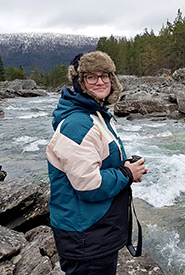Canadian conservationists, worldwide
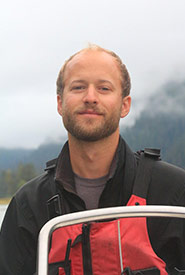
Joel White (Photo by Bertil Kinnby)
We nature lovers get many opportunities to support our environment on home turf and abroad. During my research at a marine biology conference in Plymouth, U.K., I met Joel White (30), a native of British Columbia, who moved 6,440 kilometres away to the tiny Swedish island of Tjärnö. The conservationist and technician tells us what it’s like to live and work at a Scandinavian marine field station and how his work abroad affects the Canadian environment.
Read my interview with Joel below:
Samanta Hoffmann (SH): Joel, you've committed yourself to environmental topics since a very young age, you've studied biology and ocean sciences at the University of Victoria, and you've always worked with nature somehow. How do you explain your closeness to nature, growing up in Nelson, BC?
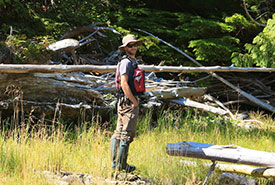
As a true outdoor fan, Joel's work and lifestyle have always been about nature. (Photo by Elisabet Kinnby)
Joel White (JW): I think my upbringing explains my closeness to nature, both living in a rural neighbourhood outside a small town, and having very environmentally conscious parents. It’s a fact of life more than an active decision for me, and it absolutely has had a great impact on my life both personally and professionally. I’ve been lucky enough to earn a living associated with nature all my life, whether that’s teaching children to paddle kayaks on Kootenay Lake, doing research in the Arctic or guiding guests around the Central Coast of BC from a ship.
SH: And in 2016 you decided to make an international career move — more than 6,000 kilometres away from your family and friends. Why did you choose to go to Sweden?
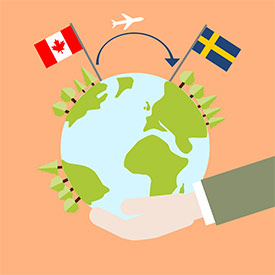
Plane flying from Canada to Sweden (Graphic by Samanta Hoffmann)
JW: Because that’s where my fiancée lives and works. I made the move for strictly personal reasons, although it’s turned out to be a very interesting career move as well.
SH: Today, you work as a remotely operated underwater vehicle (ROV) pilot and technician at the renowned Tjärnö Marine Laboratory on a tiny island on the west coast of Sweden. What is it like there?
JW: I work at a university research station, so I have lots of coworkers from all around the world. There are 115 people that live on the island year-round, and it’s only a 20-minute drive over a few bridges into town. I was most excited that we have reliable cell service and WiFi all over the station, because I’m used to Bamfield Marine Sciences Centre on the west coast of Vancouver Island. It’s a whole different class of remote, and the cell service is far from reliable.
SH: What does your daily work look like?
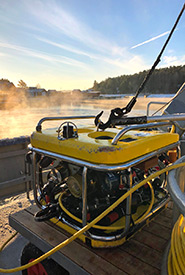
The Ocean Modules Sii (search, identification and intervention) is an ROV that allows scientists to explore the ocean. (Photo by Joel White)
JW: My actual work varies a lot, because my position is funded both by one of the research groups on station and by the marine infrastructure. If I have any ROV work booked that day, then I’ll be out with that. Most commonly, the research team uses a small-ish Ocean Modules Sii, which is about the size of a small coffee table and weighs 50 kilograms. I use it to show interested people the habitat and also to collect data for scientific research, in a lower-impact and more accurate manner than the classic dredging for samples. We can also collect more detailed samples of rarer species, and we’ve had other researchers from all over the world — including Canada — come here to take advantage of it. We’ve also used it to collect lost fishing gear from local trap fisheries and reduce the ghost-fishing impact in the nearby marine national park.
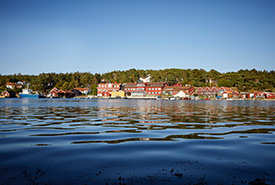
The Tjärnö Marine Laboratory on the Swedish west coast. (Photo by Anna-Lena Lundqvist)
The other half of my time I work with seaweed aquaculture. Our research group has a large test site for growing sugar kelp. The research is geared toward using kelp both as food and as a raw material. Our team is focussed on growing the algae in the most resource-effective and sustainable way.
SH: What would you consider is the main advantage of collecting professional experiences abroad for somebody who works with nature?
JW: As much as it’s a stereotype, I have to say that it gives you a new perspective. When I grew up, I just assumed that everywhere looked like Nelson. I didn’t realize how special it was. Likewise, the first time I went to a big city I just assumed that everything was concrete and grey, so I didn’t know how to look for the beautiful gardens and small spaces that keep so much life alive in urban areas. Learning these new perspectives helps you grow.
SH: What advice do you have for other Canadians who want to experience working with nature in another country?
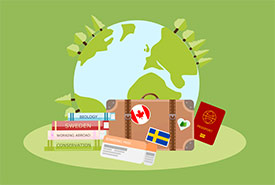
Travel suitcase (Graphic by Samanta Hoffmann)
JW: Absolutely do it; it’s worth the effort. I think Canadians in general are pretty good about travelling and appreciating the natural beauty they have at home, but you can never do that too much. It’s important to see how things are done in different parts of the world, how different countries relate to their environment in different ways. It reminds you to appreciate some things about where you grew up, but it also gives you new things to appreciate in both places.
Also, do what you can to learn the local language! Even if everyone speaks English, like in Sweden, people are much more relaxed if you can talk to them on their own terms. Just knowing a few simple sentences is enough to unlock a lot of goodwill, and you never know what sort of doors it might open!
SH: What advice do you have for people who would love to experience working with nature in Canada?
JW: Canada has lots of nature, in every shape and size, and it will blow your mind. In my experience, it can be harder to get to the really special places in Canada without local knowledge, so making friends is also important. Go to Canada and experience it. There are great organizations like the Nature Conservancy of Canada, volunteer groups and wonderful places to explore. Just don’t underestimate the distances and scales involved. As long as you’re open to new experiences and ideas, you won’t have a bad adventure.

